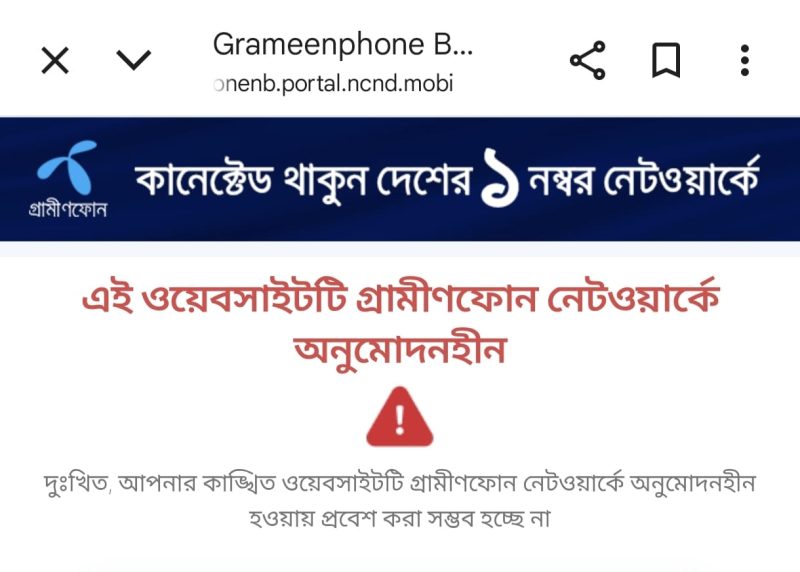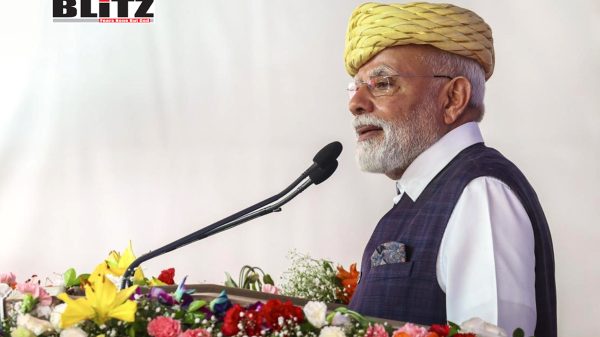Press freedom under attack in Bangladesh: Grameen Phone blocks Blitz website amid Yunus regime crackdown
- Update Time : Monday, September 22, 2025

Grameen Phone, Bangladesh’s largest mobile network operator, has taken an alarming and unlawful step by blocking access to the online edition of Blitz, most influential newspaper published from Bangladesh, for its millions of subscribers. This blatant act of censorship appears to be a direct reprisal for Blitz’s fearless reporting on the widespread repression, corruption, and Islamist-jihadist agenda of Muhammad Yunus and his associates. By cutting off public access to independent journalism, Grameen Phone has effectively sided with authoritarian forces seeking to silence dissent and control the flow of information in Bangladesh.
For years, Blitz has exposed Yunus’s shady dealings – from his controversial microcredit ventures riddled with irregularities both in Bangladesh and the United States, to his close financial and political ties with figures such as George Soros, Bill Clinton, and Hillary Clinton. Thousands of readers have now reported that they cannot access the site through Grameen Phone’s network, raising serious questions about collusion between the operator and Yunus’s unelected regime.

Readers trying to log-in to Blitz online edition using SIM of Grameen Phone are told – “This website is not approved by Grameen Phone network”
Adding to this troubling development, the regime has also blocked access to the official website of the Government of Canada. The reason? Ottawa’s publication of a high-level travel advisory warning its citizens about worsening security conditions in Bangladesh. The advisory highlights the risks of violent protests, militant activity, and politically motivated unrest, particularly under the climate of repression created by the Yunus-led interim regime.
The Canadian notice urges its citizens to “exercise a high degree of caution” while in Bangladesh, noting:
“Exercise a high degree of caution in Bangladesh due to possible demonstrations, clashes, and nationwide general strikes. The security situation could deteriorate with little warning”.
It further warns:
“Avoid all travel to the Chittagong Hill Tracts region due to politically motivated violence, kidnappings, and sporadic ethnic clashes”.
The advisory paints a bleak picture of the security situation:
- A strong military presence in major cities;
- Traffic delays and disruptions due to unrest;
- Persistent risks of sudden clashes and militant attacks.
On the Chittagong Hill Tracts, Canadian authorities detail how armed groups—aligned with rival political factions – frequently engage in violence, extortion, and cross-border smuggling of drugs, weapons, and money. The warning underscores that kidnappings and ethnic clashes remain a serious danger in the region.
The legal and ethical implications
The decision of a private telecom operator like Grameen Phone to block a news outlet raises profound legal and ethical questions. Under the principles of net neutrality, service providers are prohibited from discriminating against lawful online content or restricting access based on political bias. By selectively targeting Blitz, Grameen Phone has violated this principle and undermined the very idea of an open and free internet.
Furthermore, this action represents a direct assault on press freedom. International human rights conventions, including Article 19 of the Universal Declaration of Human Rights, enshrine the right to “seek, receive, and impart information and ideas through any media”. Blocking access to an independent newspaper erodes public trust, restricts transparency, and denies citizens their right to be informed.
From a consumer rights perspective, subscribers pay Grameen Phone for internet services with the expectation of open access. Unilaterally restricting websites amounts to cheating customers by depriving them of what they have legally purchased. It also sets a dangerous precedent, whereby telecom providers may act as political tools of ruling regimes rather than neutral service providers. If unchecked, such practices will normalize state-backed censorship in Bangladesh’s digital sphere.
The blocking of both Blitz and the Canadian Government’s website is more than an isolated act of censorship. It signals a disturbing pattern: the Yunus regime is attempting to systematically control information by silencing critics, hiding international warnings, and cutting off citizens’ access to truth. Such tactics are characteristic of regimes that fear accountability and thrive only through suppression of free press and manipulation of public perception.
The illegal censorship of Blitz by Grameen Phone and the blocking of Canada’s travel advisory by Bangladesh authorities are not just attacks on freedom of the press – they are attacks on the fundamental rights of Bangladeshis to be informed. By targeting Blitz, the regime reveals its fear of independent journalism that exposes its corruption and Islamist agenda. By silencing Canada’s warnings, it gambles recklessly with the safety of foreign visitors. These actions make it clear: Bangladesh is sliding rapidly into a dark era where truth itself is treated as a threat. If this dangerous precedent is not challenged, the very foundations of democracy and free expression in the country will be irreparably damaged.










